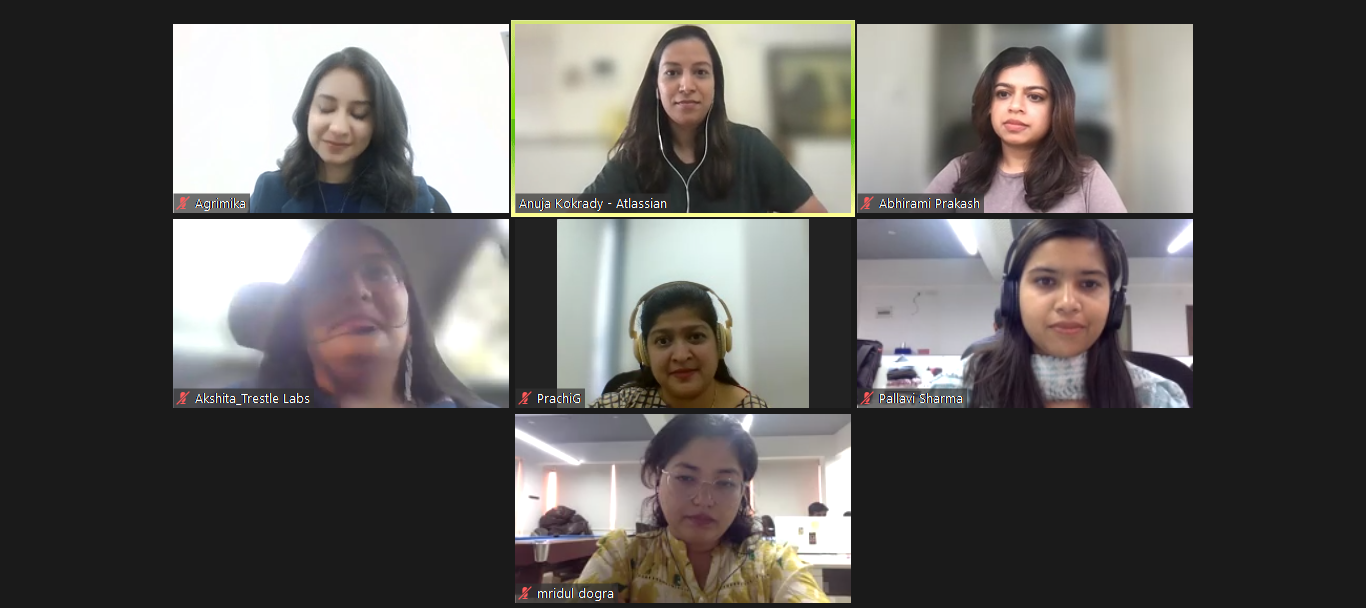In an impactful roundtable discussion held on International Women's Day 2024 on the topic - Strategies to Build a Diverse and Inclusive Ecosystem in the Tech Sector , esteemed professionals from diverse backgrounds converged to illuminate strategies for fostering inclusivity and diversity within the tech sector. Anchored by Agrimika Joshi, Marketing Executive at Nineleaps, the panel featured Akshita Sachdeva, Co-Founder of Trestle Labs; Anuja Kokrady, Manager of Product Data Science at Atlassian; Abhirami Prakash, Manager - Sales Whatfix; and Prachi Gupta, Associate Project Manager at Nineleaps.
Their conversation highlighted various facets, the transformative power of inclusion, the inherent strength of diversity, and the imperative of addressing systemic barriers. From advocating for holistic assessment in hiring to championing mentorship and empowerment initiatives, these leaders underscored the vital role of inclusive practices in driving organizational success.

The discussion began with Agrimika putting forth the topic along with a comprehensive introduction to why it is important in the tech sector.
Akshita began by stressing on the significance of inclusion, emphasizing that it should permeate every aspect of organizational functioning. She highlighted the importance of accommodating individuals with diverse backgrounds, abilities, and perspectives, not only as a means of meeting diversity quotas but as a strategy for driving innovation and problem-solving.
“As leaders, we need to shift our lens from the perspective of diversity to a perspective based on merit to make a difference. Inclusion will follow”
She also emphasized the need for organizations to adopt inclusive practices that go beyond surface-level diversity initiatives, encouraging genuine collaboration and mutual respect among team members.
Anuja elaborated on the tangible benefits of diversity, stressing that it is not merely a moral imperative but a strategic advantage for businesses. She shared examples of how diverse teams are better equipped to tackle complex challenges, offering fresh insights and innovative solutions.
“It is a universal fact that the loudest voices in the room are the ones that shape outcomes. We must amplify our voices, making them resonate with such force that they cannot be ignored or silenced.”
Anuja also underscored the need for organizations to actively seek out diverse talent and create environments where individuals feel valued and empowered to contribute their unique perspectives.
Building on the discussion, Abhirami delved deeper into the systemic barriers that hinder inclusivity in the workplace. She highlighted the need for organizations to address unconscious biases in hiring, promotion, and performance evaluation processes.
“Societal norms have shaped our sense of self-worth. We need to learn to be confident without fear of ridicule and stand up for things that amplify what we our worth.”
Abhirami emphasized the importance of accountability at all levels of the organization, urging leaders to actively challenge discriminatory practices and create opportunities for underrepresented groups to thrive.
Prachi underscored the importance of shifting hiring paradigms to focus on attributes such as attitude, adaptability, and creativity, rather than solely on technical skills. She emphasized the role of educational institutions in fostering diversity by providing equal opportunities and exposure to students from diverse backgrounds.
“Systems in place need to change to empower all voices while remaining transparent across avenues.”
Prachi also highlighted the importance of mentorship programs in supporting the professional development of women and other marginalized groups, enabling them to navigate and succeed in male-dominated industries.
In her role as moderator, Agrimika facilitated a nuanced discussion by posing these critical questions, allowing the panelists to share their insights and perspectives on the challenges and opportunities for promoting gender equality and empowering women entrepreneurs in Bengaluru's vibrant startup ecosystem.
In addition to gender pay gaps and biased hiring practices, the speakers discussed other challenges, including workplace discrimination, lack of representation in leadership roles, and cultural barriers to inclusion. They emphasized the need for organizations to adopt comprehensive diversity and inclusion strategies that address these challenges holistically, including training on unconscious bias, implementing flexible work policies, and establishing employee resource groups to support marginalized communities.
They also emphasized that leadership is critical in driving organizational cultural change. They discussed the importance of visible and committed leadership in setting the tone for inclusive practices and fostering a culture of belonging. The speakers also highlighted the need for leaders to undergo training on diversity, equity, and inclusion to ensure they have the skills and awareness to champion these initiatives effectively.
In addition to providing open forums for transparent communication, the speakers stressed the importance of mentorship and sponsorship programs in supporting the career advancement of underrepresented groups. They highlighted the role of mentors in providing guidance, advice, and advocacy to help individuals overcome barriers and achieve their full potential. The speakers also emphasized the need for organizations to invest in leadership development programs that prioritize diversity and inclusion, ensuring that future leaders are equipped with the skills and awareness to drive meaningful change.
In conclusion, the speakers reiterated that achieving a harmonious work-life balance requires a multifaceted approach that prioritizes diversity, equity, and inclusion at every level of the organization. They emphasized that organizations must move beyond tokenistic diversity initiatives and commit to creating cultures where all individuals feel valued, respected, and empowered to bring their authentic selves to work. By embracing diversity and fostering inclusive practices, organizations can unlock the full potential of their talent pool and drive sustainable success in an increasingly global and interconnected world.